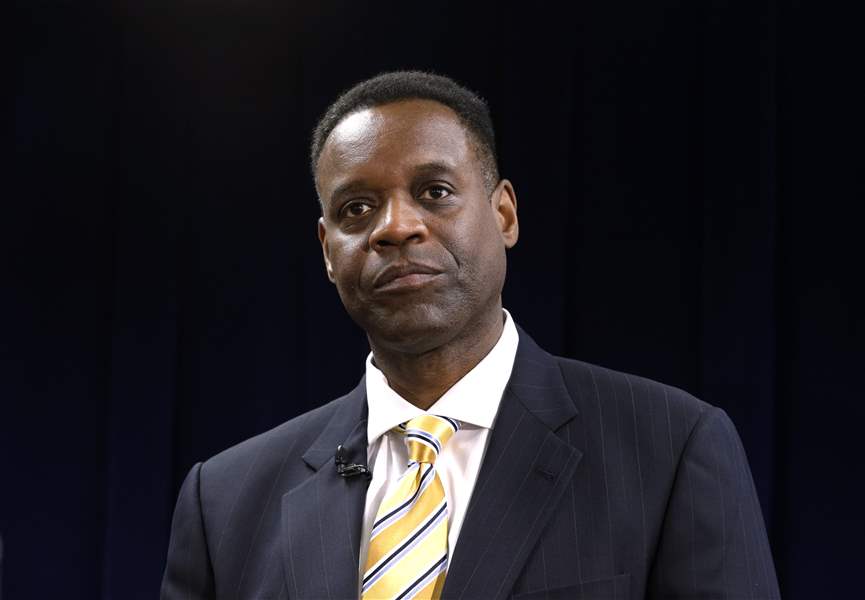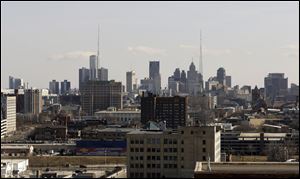
Emergency manager reveals Detroit is nearly broke; city may have no choice except bankruptcy
5/13/2013
ASSOCIATED PRESS

Kevyn Orr, the citys state-appointed emergency manager, said Detroit is broke and faces a bleak future given the precarious financial path it's on.
DETROIT — The first report by Detroit's emergency manager declares that the city is broke and at risk of running completely out of money — a financial meltdown that could mean employees don't receive paychecks, retirees lose their pensions and residents endure even deeper cuts in municipal services.
If Detroit cannot avert disaster, the only remaining option appears to be bankruptcy, a threat that looms large over Kevyn Orr's urgent efforts to make deals with creditors and debt holders. Experts say he will have to seek concessions from those groups to keep the Motor City afloat.
"On a cash-flow basis, we don't have it. We're broke," Orr said today at a news conference. He said the city can make payroll through the rest of the year, but that some other bills and obligations are not being paid or are being deferred.
"We can't continue to do what we've been doing," he said. "It's probably a little worse than I expected. It's severe. I mean it's dire."
In March 2012, Detroit borrowed $80 million from Bank of America to avoid running out of money. But the outlook has not improved in the last year.
"No question his first attention has got to be turned to making sure he has enough money to pay the bills he has coming in," said James McTevia, president of McTevia and Associates, a Detroit-area turnaround firm. "If I'm a creditor getting paid for my current goods and services, I'm going to be more apt to work out on something I'm owed."

Kevyn Orr.
Orr, a Washington-based turnaround expert and bankruptcy attorney, was selected by Gov. Rick Snyder to oversee Detroit's finances. In his report, Orr described the city's operations as "dysfunctional and wasteful after years of budgetary restrictions, mismanagement, crippling operational practices and, in some cases, indifference or corruption."
"Outdated policies, work practices, procedures and systems must be improved consistent with best practices of 21st century government," Orr wrote. "A well-run city will promote cost savings and better customer service and will encourage private investment and a return of residents."
Detroit's net cash position — the amount of money in the bank after bills are paid — was a negative $162 million as of April 26. The budget deficit that a few months ago was believed to be about $327 million could reach $386 million before July 1.
The city also owes more than $400 million, including $124 million for public improvement projects. Its long-term debt tops $14 billion.
Orr avoids using "bankruptcy" in the 41-page report to the state treasurer, but the inference is clear, McTevia said.
Orr may choose to go before a bankruptcy judge "when he gets his back against the wall and he can't meet payroll and he has to have court protection," McTevia told The Associated Press today.
"He can default on payments to pension funds. He will try to sit down and negotiate with the pension funds: 'We can do this out of court or we can do this in court.' The same thing with bond holders. It will take years for Detroit to ever pay its bonds, and they need to be negotiated," McTevia said.
Michigan Gov. Rick Snyder said bankruptcy wasn't inevitable.
"There's a whole process you go through, and the process includes trying to work with people to not have that happen," the governor said.
The deficit is "a huge challenge," he added. "So the hurdle there is very high, but again we should try that first."
The bulk of the city's revenue comes from property and business taxes. But Detroit's population dropped by 250,000 between 2000 and 2010. And outside of downtown and a few other areas, business growth virtually is nil.
"He certainly cannot, nor should he, borrow any money to keep the company afloat," McTevia said. "My gut feeling is that taxes are going to have to be raised at some time," possibly a temporary surcharge on businesses to keep the city afloat.
A Chapter 9 bankruptcy filing would also come with even more spending cuts for the city, according to Wayne State Law School professor Peter Henning.
"Services never improve after a bankruptcy," Henning said. "I read through Orr's report. The emphasis is really on the cost-cutting and the restructuring. Rarely does that improve services in the short run. In the short run, city services are going to suffer."
If a decision is made on pursuing bankruptcy, it could come in three to six months, Henning added.